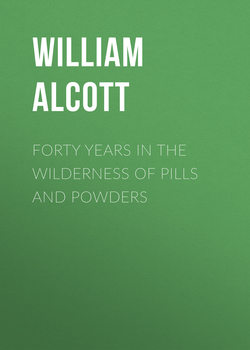Читать книгу Forty Years in the Wilderness of Pills and Powders - Alcott William Andrus - Страница 14
CHAPTER XII
MANUFACTURING CHILBLAINS
ОглавлениеAt the period of my life to which we have at length arrived, I was for four or five months of every year a school teacher. This was, in no trifling degree, an educational process; for is it not well known that,
"Teaching we learn, and giving we retain?"
It was at least an education in the great school of human nature.
Every morning of one of these winter sessions of school keeping, Lydia Maynard, eight years of age, after walking about a mile, frequently in deep snow, and combating the cold northwest winds of one of the southern Green Mountain ranges, would come into the schoolroom with her feet almost frozen, and take her seat close to the stove, so as to warm them and be ready for school as quickly as possible. Here she would sit, if permitted to do so, till the bell rang for school.
It was not long before I learned that she was a great sufferer from chilblains. Whether she inherited a tendency to this troublesome and painful disease, which was awakened and aggravated by sudden changes of temperature, or whether the latter were the original cause of the disease, I never knew with certainty. But I was struck with the fact that sudden warming was followed by such lasting and terrible consequences.
And herein is one reason why I have opposed, from that day to this, the custom or habit, so exceedingly prevalent, of rushing to the fire when we are very cold, and warming ourselves as quickly as possible. I have reasoned; I have commanded; and in some few instances I have ridiculed. Every one knows it is hazardous to bring the ears or fingers or toes, or any other parts of the body, suddenly to the fire when really frozen, – that is, when the temperature is lowered down in the part to 32°; and yet, if it is only down to 33°, and the part not quite frozen, almost every one, young and old, will venture to the fire. Can there be such a difference in the effects when there is only a difference of one degree in temperature? No reflecting person will for one moment believe it. The trouble is we do not think about it.
Sudden changes from heat to cold are little more favorable than when the change is in the other direction. Indeed, it often happens that children at school are subjected to both these causes. Thus, in the case of Lydia, suppose that after roasting herself a long time at the stove, she had gone to her seat and placed her feet directly over crevices in the floor, through which the cold wind found its way at almost freezing temperature. Would not this have greatly added to the severity of the disease?
There are, it is true, other reasons against sudden changes of temperature, particularly the change from cold to heat, besides the fact that they tend to produce chilblains; but I cannot do more just now than barely advert to them. The eyes are apt to be injured; it renders us more liable than otherwise we should be to take cold. Occasionally it brings on faintness and convulsions, and still more rarely, sudden death. I will only add now, that sudden warming after suffering from extreme cold, whether we perceive it or not at the time, is very apt to produce deep and lasting injury to the brain and nervous system.
But my main object in relating the story is answered if I have succeeded in clearly pointing out to the reader one of the avenues through which light found its way to my benighted intellect, and led me to reflection on the whole subject of health and disease. Here was obviously one cause of a frequent but most painful complaint. It was natural, perfectly natural, that by this time I should begin to inquire. Have all diseases, then, their exciting causes? Many certainly have; and if many, perhaps all. At least, how do we know but it may be so? And then again, if the causes of chilblains are within our control, and this troublesome disease might be prevented, or its severity mitigated if no more, why may it not be so with all other diseases?
To revert for a moment to the case of Lydia Maynard. Though I was the cause, in a certain sense, of her suffering, yet it was a sin of ignorance. But it taught me much wisdom. It made me cautious ever afterward. I do not doubt but I have been a means of preventing a very considerable amount of suffering in this form, since that time, by pointing out the road that leads to it.
Prevention is better than cure, was early my motto, and is so still. And from the day in which I began to open my eyes on the world around me, and to reason from effects up to their causes, I have been more and more confirmed in the belief that mankind as a race are to be the artificers of their own happiness or misery. All facts point in this direction, some of them with great certainty. And facts, everywhere and always, are stubborn things.
